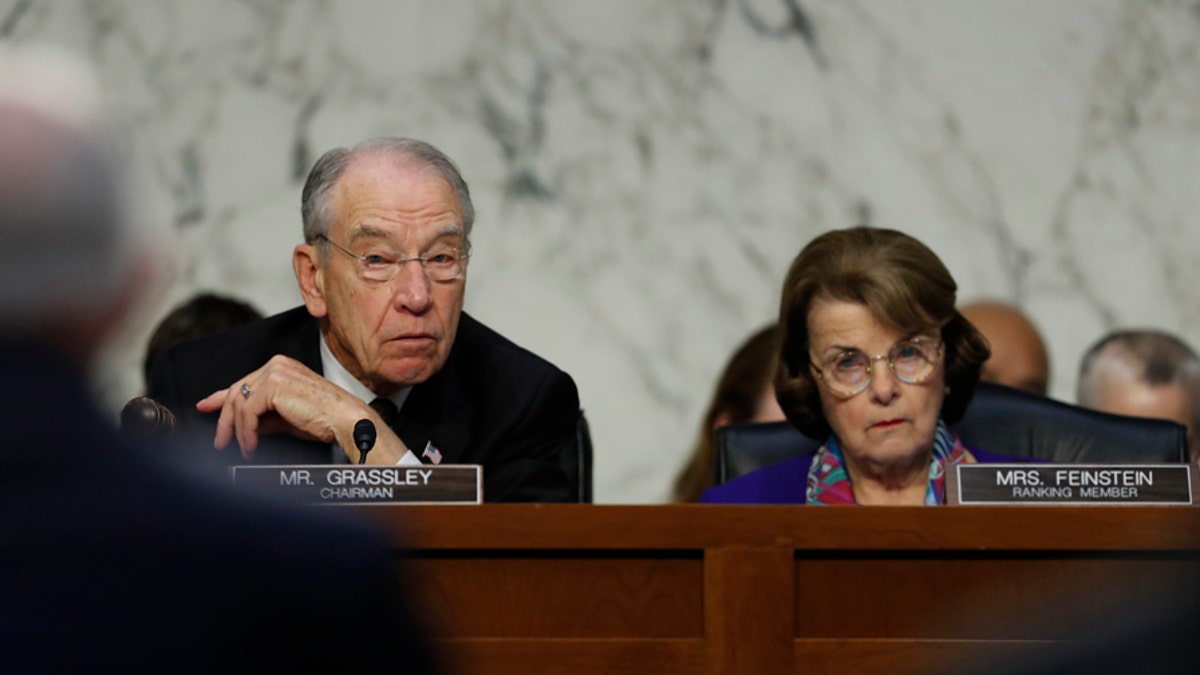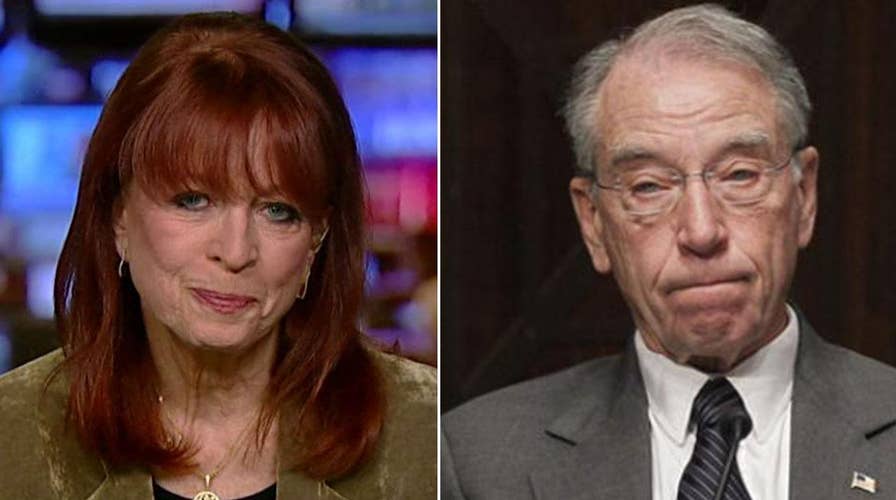Lawyer: Unconstitutional to block FBI informant's testimony
Victoria Toensing wants DOJ to release client from non-disclosure agreement so he can testify on Obama-era Russian nuclear deal.
A top Senate Republican is calling for the Justice Department to lift an apparent “gag order” on an FBI informant who reportedly helped the U.S. uncover a corruption and bribery scheme by Russian nuclear officials but allegedly was “threatened” by the Obama administration to stay quiet.
Senate Judiciary Committee Chairman Chuck Grassley, R-Iowa, is focusing on the informant amid scrutiny of the 2010 approval of a controversial uranium deal with a Russian company. He’s raising questions about potential “conflicts of interest” for Hillary Clinton and the Obama administration, and especially wants to know whether the committee that approved the deal was aware of the FBI probe involving a subsidiary of the same Russian firm.
On Thursday, President Trump called the issue “your real Russia story” and said “it’s a disgrace” that the “fake news won’t cover” it.
The deal in question, which was previously reported, involved the 2010 approval of a partial sale of Canadian mining company Uranium One to Russia’s Rosatom nuclear company. The U.S. was involved because the sale gave the Russians control of part of the uranium supply in the U.S.
TRUMP BLASTS 'FAKE MEDIA' FOR IGNORING URANIUM DEAL STORY
Grassley wrote in letters last week to federal agencies that he’s not “convinced” by previous “assurances” that there were no unresolved national security concerns, and revealed Thursday that he wants to hear from the FBI informant in the Russia corruption probe.
“Witnesses who want to talk to Congress should not be gagged and threatened with prosecution for talking. If that has happened, senior DOJ leadership needs to fix it and release the witness from the gag order,” Grassley said in a statement.
Victoria Toensing, a lawyer for the former FBI informant, told Fox News’ “America’s Newsroom” that her client has “specific information about contributions and bribes to various entities and people in the United States.”

Senate Judiciary Committee Chairman Chuck Grassley, R-Iowa, left, and ranking member Sen. Dianne Feinstein, D-Calif., look to Attorney General Jeff Sessions as he testifies before the Senate Judiciary Committee on Capitol Hill in Washington, Wednesday, Oct. 18, 2017. (AP Photo/Carolyn Kaster) (AP)
She said she could not go further because her client has not been released from a nondisclosure agreement but suggested the gag order could be lifted soon. Toensing also claimed that her client was “threatened by the Loretta Lynch Justice Department” when he pursued a civil action in which he reportedly sought to disclose some information about the case.
In a letter sent Wednesday to Attorney General Jeff Sessions, Grassley said such an NDA would “appear to improperly prevent the individual from making critical, good faith disclosures to Congress of potential wrongdoing.”
He asked for a copy of the NDA by Nov. 1 and requested that, should one exist, “you release him from it and pledge not to engage in any form of retaliation against him for good faith communications with Congress.”
Sessions separately sent a letter to Toensing asking to set up an interview with the former informant. Grassley wrote, “It appears that your client possesses unique information about the Uranium One/Rosatom transaction and how the Justice Department handled the criminal investigation into the Russian criminal conspiracy.”
The Hill reported earlier this week that the FBI had evidence as early as 2009 that Russian operatives used bribes, kickbacks and other dirty tactics to expand Moscow’s atomic energy footprint in the U.S. Grassley on Wednesday released a series of letters he fired off last week to 10 federal agencies, raising the question of whether the Committee on Foreign Investment in the United States (CFIUS) which approved the uranium transaction was aware of that FBI probe -- and pointing to potential “conflicts” involving the Clintons. The committee included then-Secretary of State Clinton.
It had been previously reported that figures tied to the transaction gave donations to Bill Clinton and his family foundation, but Grassley wrote that he has learned additional details about a $500,000 fee the former president got from a Russian investment bank for a June 2010 speech. He wrote that the bank’s senior officers include former Russian intelligence personnel, and sources had described the company as an “extension” of the Russian government.
“Notably, in the same month as the Clinton speech, Uranium One and Rosatom notified CFIUS of the Russian government’s intent to acquire 20 percent of the United States’ uranium assets. The next month, in July 2010, Renaissance Bank reportedly assigned Uranium One a ‘buy’ rating, a move that would principally benefit its Russian investors,” Grassley wrote. “The donations raise concerns about potential conflicts of interest for Secretary Clinton and the Obama administration.”
As noted in The Hill, the feds did eventually go after Vadim Mikerin, a Russian nuclear industry official, in connection with the investigation. He was later sentenced, in 2015, to 48 months in prison in connection with money laundering allegations.
When details of the Uranium One deal first emerged in 2015, Clinton’s campaign downplayed the allegations.
"No one has produced a shred of evidence that Hillary Clinton ever took action as Secretary of State in order to support the interests of donors to the Clinton Foundation," a spokesman said at the time. "To suggest the State Department, under then-Secretary Clinton, exerted undue influence in the U.S. government's review of the sale of Uranium One is utterly baseless.”
Fox News’ Judson Berger, Griff Jenkins and Brooke Singman contributed to this report.





